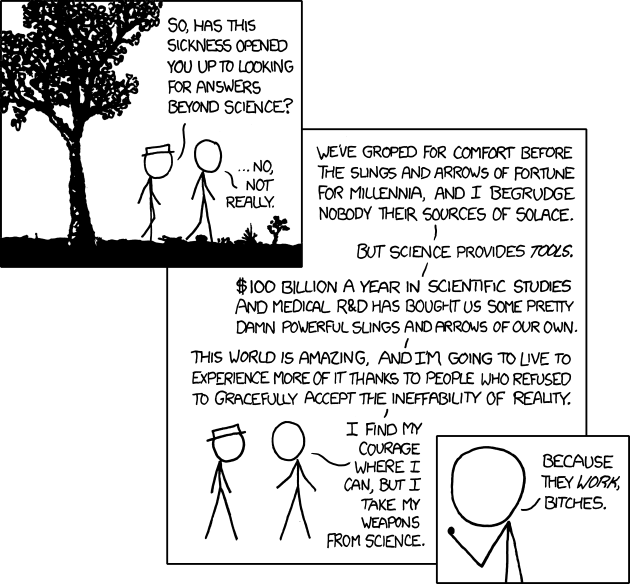
"Why are you such a skeptic?" Was the question I was asked, and not without a little consternation. As if skepticism was an illness, or at least a dirty word. I didn't have a good answer. I'd never really thought about it. "Why aren't we all skeptics?" seemed like the better question. The benefits of practicing healthy skepticism seem to outweigh the problems a hundred to one. (Never tempted to buy something from an infomercial? Check. Not wasting money on the lottery? Check. Saving time and sanity not listening to Rush Limbaugh/Sean Hannity/Glen Beck? Check.)
When did skepticism become such a bad thing? Without skepticism, would we still be doing lobotomies and letting blood? Would we have any of the advances of modern science? It's been hundreds of years since Galileo was branded a heretic; why are we still fighting the same battles?
But I digress. The answer to the original question is that I am a skeptic because I've seen the evidence and I don't know how else to be. Based on evidence, I believe in tachyons, mesons, and gluons. I believe that the universe is 13.75 billion years old and earth is about 4.74 billion years old. Based on the lack of evidence, I don't believe in intelligent design, ghosts, horoscopes, aliens, crop circles, homeopathic medicine, or chiropractics.
If you believe in one or more of those things, I don't think you're an idiot. One of the realities of being a healthy skeptic (at least one with any friends), is to accept that people might have beliefs that run counter to your conclusions, even if you've seen the same evidence. Even ardent skeptics may allow powerful non-skeptic elements into their lives. This is healthy; this is normal. This is how we survive a violent, harsh world, and have done so for as long as we have existed.
Chiropractics is a good example. I have a lot of friends and co-workers that swear by their chiropractors and their every so often back adjustments. For those most part though, I don't think these friends buy into the core chiropractic tenet that all health problems can be traced problems with the spine. At the same time, as a skeptic, I can see, rationally, how spinal massage by a trained specialist could, if not improve health outright, positively affect a person's perception of their own health to the point that they do in fact feel better. I'm not going to begrudge anyone a belief that improves their overall quality of life.
Besides medicine, the other area that tends to get skeptics in trouble is faith. Skeptics who are tentative about belief are ridiculed for having too little faith, while skeptics who are faithful are mocked by the hardcore skeptics who reject the "opiate of the masses." It's sad on both accounts. Believers should remember that their faith was probably founded by a skeptic -- someone who challenged the traditions and status quo of their culture and their time. Similarly, The ardent skeptic should remember that the world is scary place, and those that look for comfort in a spiritual place aren't doing so out of delusion, but because human wisdom is finite and progresses at a finite pace, leaving many questions unanswered. While some people believe out of tradition (and could benefit from a bit of skepticism themselves), most of the faithful believe because of the balance it brings their lives.
Think of the Christmas holiday, for example. This is a skeptics favorite holiday, because it abounds with logical discontinuities. Christ wasn't born in December, He was born in the spring. There weren't three wise men, and it took them years to reach the Christ child. Christmas is mostly likely a pagan holiday re-purposed by early Christian churches. Many Santa Claus traditions are scary and somewhat racist. And on, and on, and on. But you know, what? Who cares? What's wrong with giving gifts to those you love? What's wrong with a little celebration during what are some of the darkest and coldest days of the year? What's wrong with reflecting on the previous year and looking forward to the next? Even if you're a skeptic and wholly reject the premise, you'd be hard pressed to say that we'd be better off without Christmas.
Overall, the reality is that faith and skepticism can readily coexist, despite those on both sides that angrily suggest otherwise. The two really can't be compared. My own faith is led by individuals of very significant intelligence, who no doubt approach practical matters with healthy skepticism -- and yet I know they have no doubts with respect to their religion convictions. As for me personally, my own skepticism has led me to enjoy the beauty and the mastery of the world through science. Knowing why a sunset produces such brilliant red hues does nothing to diminish its beauty.
If one looks over the millenia of recorded history, it may seem that science has answered the bulk of the important questions. I imagine that skeptics and scientists in every enlightened age have felt some sense of triumph of reaching the pinnacle of understanding. If there's anything we have learned, though, is that there is so much that we do not know, and may never know. This is perhaps the greatest challenge of skepticism, to accept that what you know today may not be true tomorrow. Science gives us the means to survive the world, but it is by faith that we persevere.

(comics linked from xkcd.org)